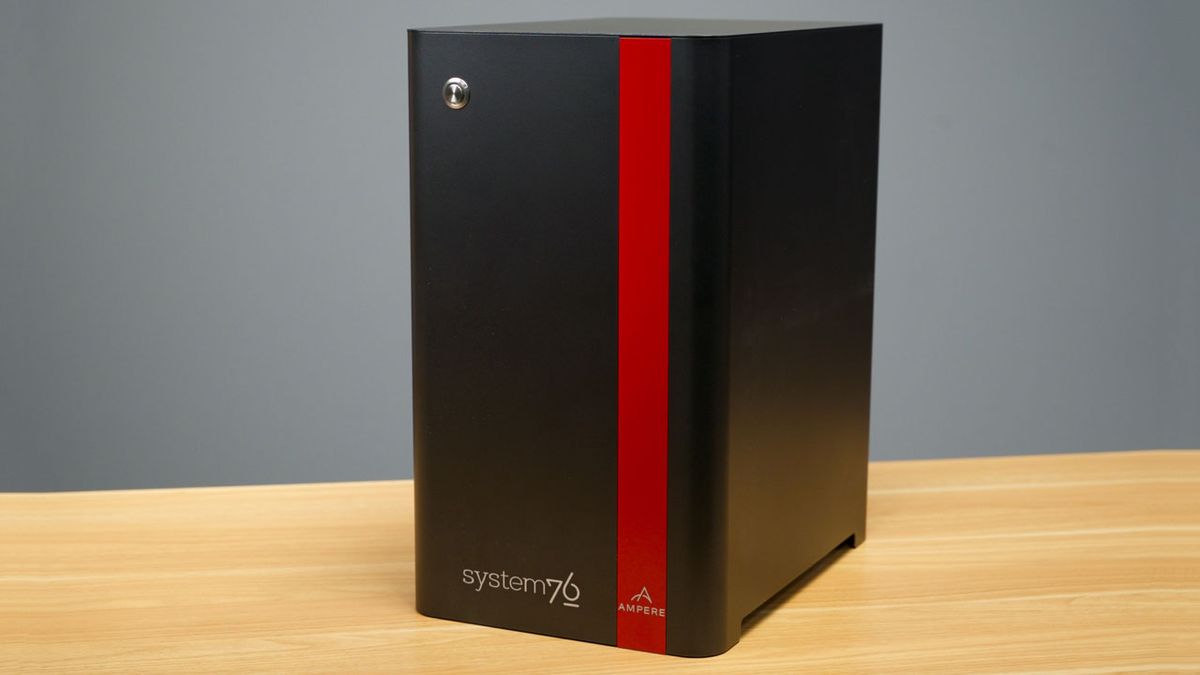World's fastest Arm PC put to the test — 128-core Ampere Altra Max CPU claims 128-core Cinebench 2024 world record
This tower of power from System76 is designed for automotive software devs and starts at $3,299.

Maker and influencer Jeff Geerling describes the recently released Thelio Astra from System76 as "the fastest Arm desktop computer in the world." Geerling backed up his assertion by testing the system in various applications. In Cinebench 2024, it scored over 5,000 points—a world record for a 120-core chip, according to HWBot's database. System76 sells Thelio Astra starting from $3,299, but the price climbs to almost $25,000 for an ultimate-spec model.
The Thelio Astra is by no means low-end in its default specified $3,200 configuration. For that, you will still get a made-in-USA system with a 64-core CPU, 64GB RAM, an Nvidia workstation GPU, and plenty of expansion options in an appealing tower case. However, the mighty 'Geerling spec' system tested in the above video pushes the envelope with a 128-core Ampere Altra Max M128-30 CPU, 512GB of octa-channel RAM, 1TB of storage (40TB max config), a relatively low-end Nvidia RTX A400 workstation graphics card (buyers can choose a 48GB Nvidia RTX 6000 Ada max config), and a dual 25 GbE NIC. This particular configuration costs a little under $7,000.
Geerling has plenty of praise for the Thelio Astra. In a series of tests, he saw the System76 machine outclassing "every other Arm PC by a huge margin." Some specifics he highlighted were the system's 1.7 TFLOPS of FP64 compute, performance in Blender, and excellent multi-thread scores in the aforementioned Cinebench 2024 (this app in Windows). Read more about the vast array of tests on Geerling's GitHub for the Thelio Astra workstation.
Zooming into the Cinebench 2024 performance of the 128-core system (in Windows), Geerling commented that the last time he tested it, the app only supported 64 cores. Thus, he was happy with Maxon's bug fixes, the Arm port, and the multi-core benchmark score of 5,003. Checking on HWBot, the currently certified world record holder for a 128-core (AMD EPYC 7713) Cinebench 2024 run scored 4,723. However, to be clear, more modern AMD CPUs with fewer cores can achieve scores over 6,000 points. The MP ratio of the Ampere CPU was also pleasingly high at 98X.
However, using Windows on this system with an Nvidia GPU is not a great idea, as Nvidia doesn't yet supply a driver for Windows on Arm. Running any apps hoping to tap into the RTX acceleration would frustrate you. System76 ships the Thelio Astra workstation with Linux, of course, with no such problem.
In the video, you can also see some tests Geerling conducted after upgrading his low-end Nvidia RTX A400 workstation graphics card (4GB) with an Nvidia RTX A4000 (16GB) from PNY and an AMD Radeon Pro W7700 (16GB) card.



We mentioned the Windows on Arm hurdles, but Geerling highlighted other problems with the otherwise excellent System76 Thelio Astra. For example, this powerful system still limits users to PCIe 4.0 and DDR4. Also, the single-core performance of the Altra Max (at 3.0 GHz) isn't stellar – just above the old Threadripper 1950X (2017) in Cinebench 2024. On the mechanical side, Geerling was also disappointed with the rattling of PCI brackets – on this otherwise pleasingly quiet and efficient system. I/O, except for Ethernet, I/O seemed somewhat limited, too, with no front I/O at all - making for a clean but inconvenient system.
Stay On the Cutting Edge: Get the Tom's Hardware Newsletter
Get Tom's Hardware's best news and in-depth reviews, straight to your inbox.
The Thelio Astra workstation will star in more upcoming Geerling videos. The next one may feature the system packing an RTX 4080 Super (16GB) to provide more gaming testing fun. Interestingly, the enthusiast comments that this machine will also support the GeForce RTX 5090—maybe that announcement should have waited until next week.
Remember, this tower PC isn't aimed at enthusiasts and gamers, though plenty of potential is seen in these tests. Instead, System76 pitches the machine to automotive software developers, with its processing power ideal for "rapid dev prototyping."

Mark Tyson is a news editor at Tom's Hardware. He enjoys covering the full breadth of PC tech; from business and semiconductor design to products approaching the edge of reason.
-
bit_user It's cool that you can do this, but the Ampere Altra is really getting quite dated, by this point. It just doesn't doesn't make a lot of sense, unless you absolutely need an ARM-based system and have a highly-threaded workload, like doing compilation & testing (or so-called continuous integration).Reply
For the $7k configuration tested, you could build a nice Threadripper system that would be way faster in lightly-threaded tasks and still outpace that Altra Max at most heavily-threaded stuff. That's because Altra Max uses basically the same vintage cores as Rasperry Pi 5.
Most Popular


